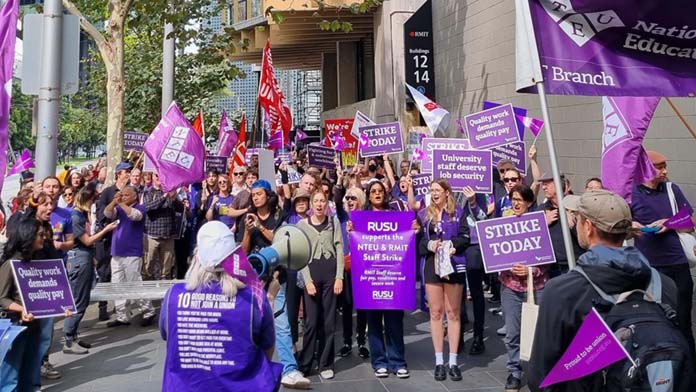There’s an upbeat mood among RMIT workers after an all-out strike for three and a half days in the week leading up to Easter.
On the first day of the strike last Monday, a rally of 400-500 National Tertiary Education Union (NTEU) members forced the closure of the Vice-Chancellery offices at Building 1.
RMIT management are among the most vicious in the sector—denying staff any pay rise for over 1000 days, increasing casuals to 70 per cent of the workforce and loading ever more work onto staff.
RMIT management have refused to come to the bargaining table for two years since the EBA expired in June 2021. RMIT NTEU members refused to do voluntary and unpaid work at Open Day in August 2022 as an initial protest. Management responded by threatening the NTEU with legal action for organising unprotected industrial action.
One EBA for all RMIT workers has been a key NTEU demand. However, RMIT management has managed to keep RMIT’s three sections divided. The lowest paid section, RMIT Training, which teaches academic English, bridging and foundation courses for those transitioning into university, accepted a separate EBA after voting for a non-union ballot in November 2023.
One thousand vocational education (VE) RMIT TAFE workers have a separate agreement that denies them the same superannuation rates, teaching loads and other rights as their 9000 higher education (HE) colleagues. But they fought off a non-union agreement last year so comprehensively that management has refused to release the final vote. They also rejected another in the week before the most recent strike.
Now VE and HE are fighting together. The NTEU’s united approach to campaigning drew in new layers of VE, professional staff, casual and postgraduate members to the pickets last week.
Thursday’s picket lines were strengthened by the presence of students and other unionists wearing keffiyehs in a show of support after a callout from staff and students in RMIT’s Books Not Bombs group.
The last day of the strike was bolstered by a visible and vocal contingent of UniMelb4Palestine students with a banner. Their arrival corresponded with a noticeable hardening in the confidence of NTEU strikers to call out staff attempting to cross the picket lines.
RMIT management was slightly panicked by this new development. Even though the Palestine contingent was relatively small, RMIT managers could see the potential power of the industrial dispute linking with a mass campaign which has as one of its key slogans “We are all Palestinians”.
Security was sent to usher through scabs, threatening NTEU organisers that they would call police and confronting students from the Palestine contingent, claiming that they were using intimidatory tactics to prevent people from entering campus. Negotiations with the NTEU occurring that morning were disrupted for a period as management focused on dealing with their “concerns” on the picket lines.
Building on this more militant mood is key to winning more secure work, decent pay and one agreement for VE and HE workers.
The mass meeting next week should do everything possible to tap into the confidence from the pickets. A suitable venue is needed where this mood can be expressed in a face-to-face meeting and next steps debated and organised. The ghostly habit of online-only meetings should be ditched.
By Tami Gadir and Marcus Banks






